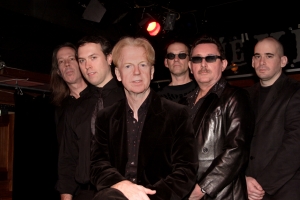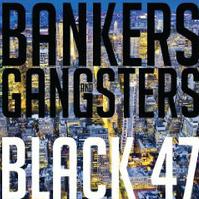
Black 47's latest album is "Bankers & Gangsters."
From left: Thomas Hamlin, Joe Burcaw, Larry Kirwan, Fred Parcells, Geoffrey
Blythe and Joseph Mulvanerty.
(Note: After a far-too-lengthy pause due to burnout, I’m getting back
into doing something I’ve always enjoyed: reviewing albums.
If you have a new CD — and it has to be available in CD format — or know
of an album I should hear one way or the other, drop me a line at
franoramaworld@gmail.com.)
Spring brings not only a renewal of life, but the awakening of the music
world from its long winter slumber. And a personal slumber as well, as I get
back into reviewing albums, which I started doing as a high school junior (“NRBQ
at Yankee Stadium,” spring 1978). I might as well ease into it with three
released in the past month by people I know — Black 47, Christine Ohlman &
Rebel Montez and Jenny Dee & the Deelinquents:
Black 47 — Bankers & Gangsters (United for Opportunity):
The Irish rockers from New York, led by Wexford native Larry Kirwan, spent the first decade-plus of their career
following a set formula of sorts. Their ’90s albums adhered to a recipe that worked: a smattering of vivid slices
of life (and occasionally autobiography) from New York and Ireland (“Funky Ceili,” “Maria’s Wedding,” “Rockin’
the Bronx,” “Czechoslovakia,” a different take on “Danny Boy”); some martyrs for the Irish cause (James Connolly,
 Michael Collins, Bobby Sands); and other personal heroes of Kirwan (Bobby Kennedy, Paul Robeson, Rory Gallagher).
Michael Collins, Bobby Sands); and other personal heroes of Kirwan (Bobby Kennedy, Paul Robeson, Rory Gallagher).
But then a funny thing happened. Well, actually, it wasn’t funny at all. It was the Cheney years. 9/11.
Thousands of New Yorkers dead (including some of the band’s fans). The trumped-up search for WMDs. The end result
was two studio albums (2004′s “New York Town” and 2008′s “Iraq,” based on letters from fans stationed there) that
reflected the strange times in which they lived. They were more somber in tone overall, more reflective affairs
— well-done albums, but not necessarily the type of discs that will spur people to want to listen (for a
parallel, look how long it took for an Iraq war film to connect with the public, and then it took an Oscar nomination)
or buy in mass quantities.
Nine years later, and now into decade No. 3, the old Black 47 is finally back. Maybe it’s the change of administration,
the cautious optimism of a new decade, or feeling some competition from younger-skewing Celtic-minded bands, or a bit of
all the above. Don’t let the obvious subject material of the title tune fool you — the damper’s been opened and the
fire’s burning more intensely than it has in years.
They blast out of the starting gate with one of the best tunes on the disc, “Long Hot Summer Coming On,” a recollection
of the ghosts of the punk days of Kirwan’s beloved Lower East Side of Manhattan (“Led by Captain Kristal,” as in late CBGB
owner Hilly Kristal), and keep up the heat with another steamy gem, “That Summer Dress,” with just a dash of sped-up reggae.
On both occasions, the band’s ultra-tight horn section (Geoffrey Blythe on sax, Fred Parcells on trombone and Joseph Mulvanerty
on pipes) finds the heart of the song quickly and doesn’t let go.
“Celtic Rocker” is a catchy tale of a teenager who falls for a rock musician and goes whole-hog, ditching the J. Crew
for Irish rock and punk (with name-checks of Flogging Molly, Dropkick Murphys, The Young Dubliners, The Clash and, natch,
Black 47). It bursts with a mix of sax-based ’70s rock, as well as touches of everything from punk to The Beatles —
and let’s not forget the occasional forays into manic reels. Black 47 will never go full-fury like Molly or the Dropkicks
— that’s not their style — but Kirwan lets the younger listeners know they know a thing or two. Or three or … well, 47.
And when Kirwan rests on time-honored topics, the result is more fun than one would expect. “Izzy’s Irish Rose,” a
turn-of-last-century love story of a Jewish guy and his Irish wife, combines a lilting Irish melody with a frantic bit
of klezmer sax from Blythe. His hero tunes this time (“Yeats and Joyce,” “Long Lost Tapes of Hendrix” and “Red Hugh,”
about late-16th Irish rebel Hugh O’Donnell) tend to drag some, but this album’s martyr tune strikes a resonant chord.
That would be “Rosemary (Nelson),” a remembrance of an Irish human rights lawyer killed in a 1999 car bombing. It
combines an ominous tone and a swaying melody with blaring horns, snarly guitar and a touch of the Clash dub sound
circa “Black Market Clash.”
Sometimes formula isn’t a bad thing, especially when an artist finds a way to make it fresh again. Kirwan and his
Black 47 mates had to spend a career eternity in the wilderness — and managed to survive it well enough —
before coming back to the sounds that established them as one of the best bands in America in the ’90s. This is a disc
that will get plenty of playtime by all the cool kids on noncommercial, internet and satellite radio as summer nears.